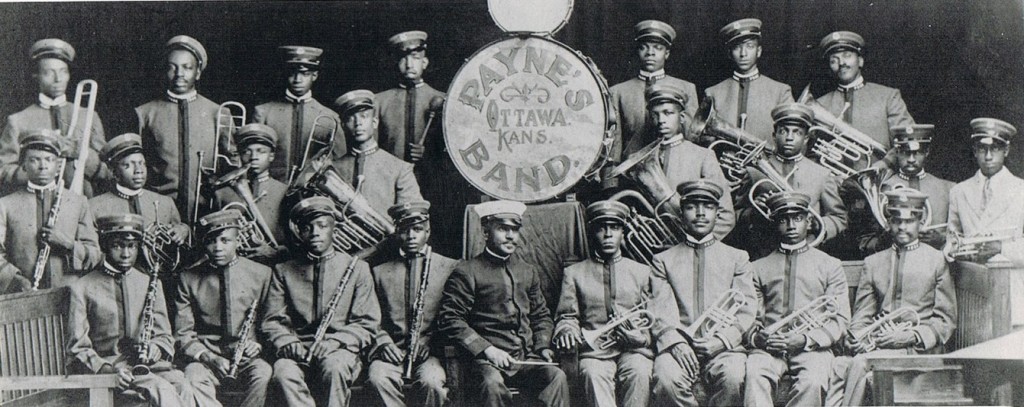March 29, 1964 Ottawa Herald “A Little of ‘The Music Man’ In Ottawa’s Past” by Don Lambert
Leaning back in his vinyl chair, it was difficult at first for 87-year-old Roy Lewis to remember back half a century. But his memory came back to him, most of it, anyway. Those golden days were when he played the clarinet in one of Ottawa’s early bands which was probably Ottawa’s only band exclusively for black men.
Roy, who was born six miles east of here and has lived here ever since, recalled when a man named Professor Payne from Kansas City came here in 1913 with the hope of starting a band.
“None of us had ever blown a note before,” he said. “So, we each tried blowing on different instruments. Whoever could blow a note on an instrument learned to play that one.”
He explained that Payne would arrive here by train and give each of the men a music lesson. Then he would get back on the train and conduct similar bands in Iola, Chanute, Parsons and Kansas City, where he had three bands including two of women.
“No one could make a living around here directing one band so he had several,” Roy explained.
After two years of practicing in the depot, blacksmith shop and assorted other places, Payne’s band was ready to perform. The band members had bought wool uniforms and learned to march.
They played ragtime and marching music at many fairs including ones at Pomona,
Waverly and Quenemo. Roy explained that those were the days when everyone went to the small town fairs and the band members often stayed there several days.
On one trip to Kansas City, they played in front of the Kansas City Star building. They also played at political rallies when politicians spoke from the steps of the Franklin county courthouse.
Roy told of one performance that was especially interesting. Gormley’s Band, made up of white men, was to play on the same program. It got to be like a contest. Payne took up his baritone horn for a solo and as Roy said, “made it sing.”
“The only difference being Gormley’s played music and we kicked up a fog.”
In addition to playing, some of the members were singers, some told jokes.
“We had a really snappy minstrel show, kind of like vaudeville,” Roy said.
But the salary wasn’t too good. The band was lucky if it received $15 for playing.
“The money we made certainly wouldn’t make you hump-back trying to carry it,” Roy joked.
Roy’s wife, Evelyn added, “Even if they didn’t make much money, the sure played some good music.”
But the 25-member band broke up in 1935.

